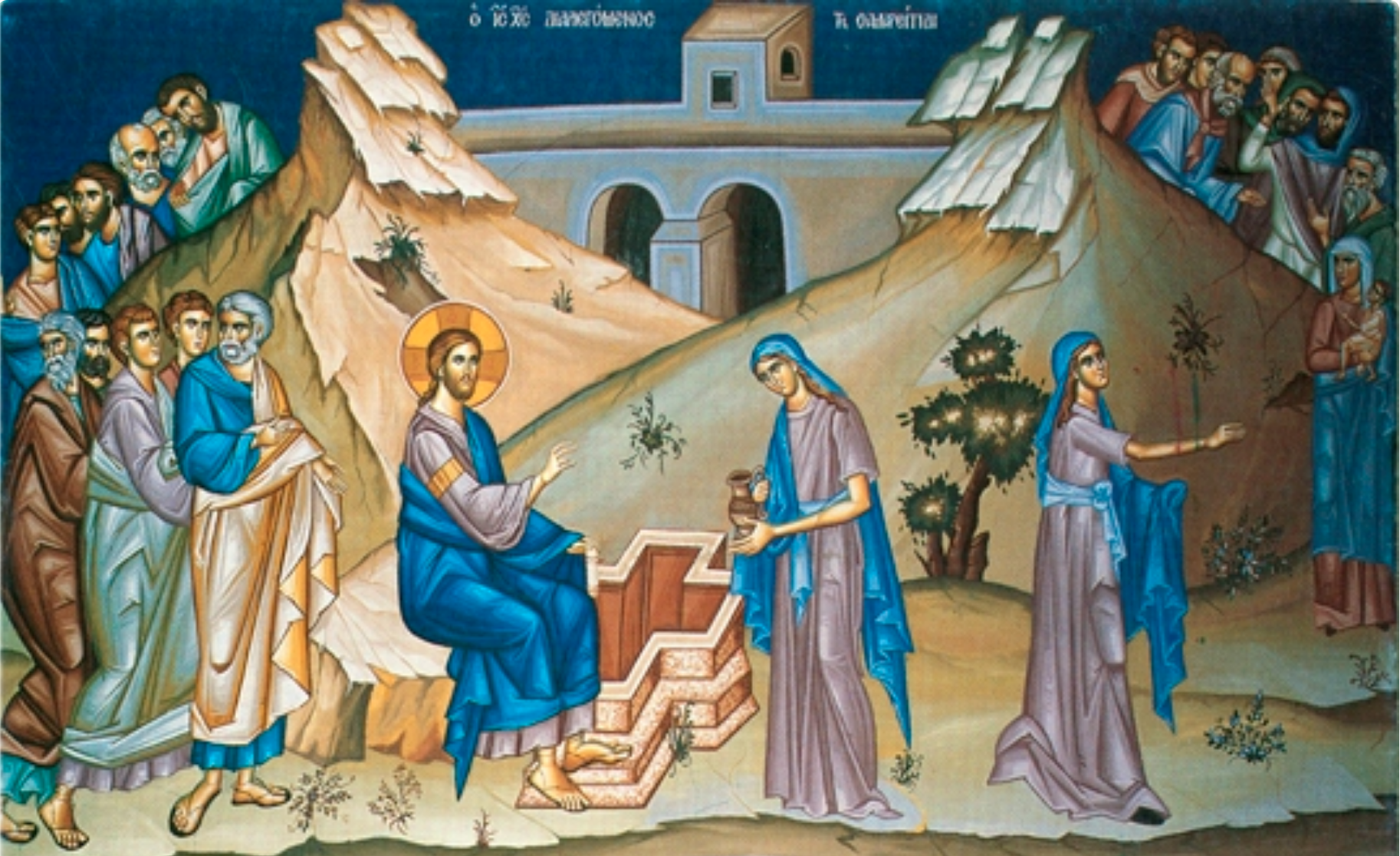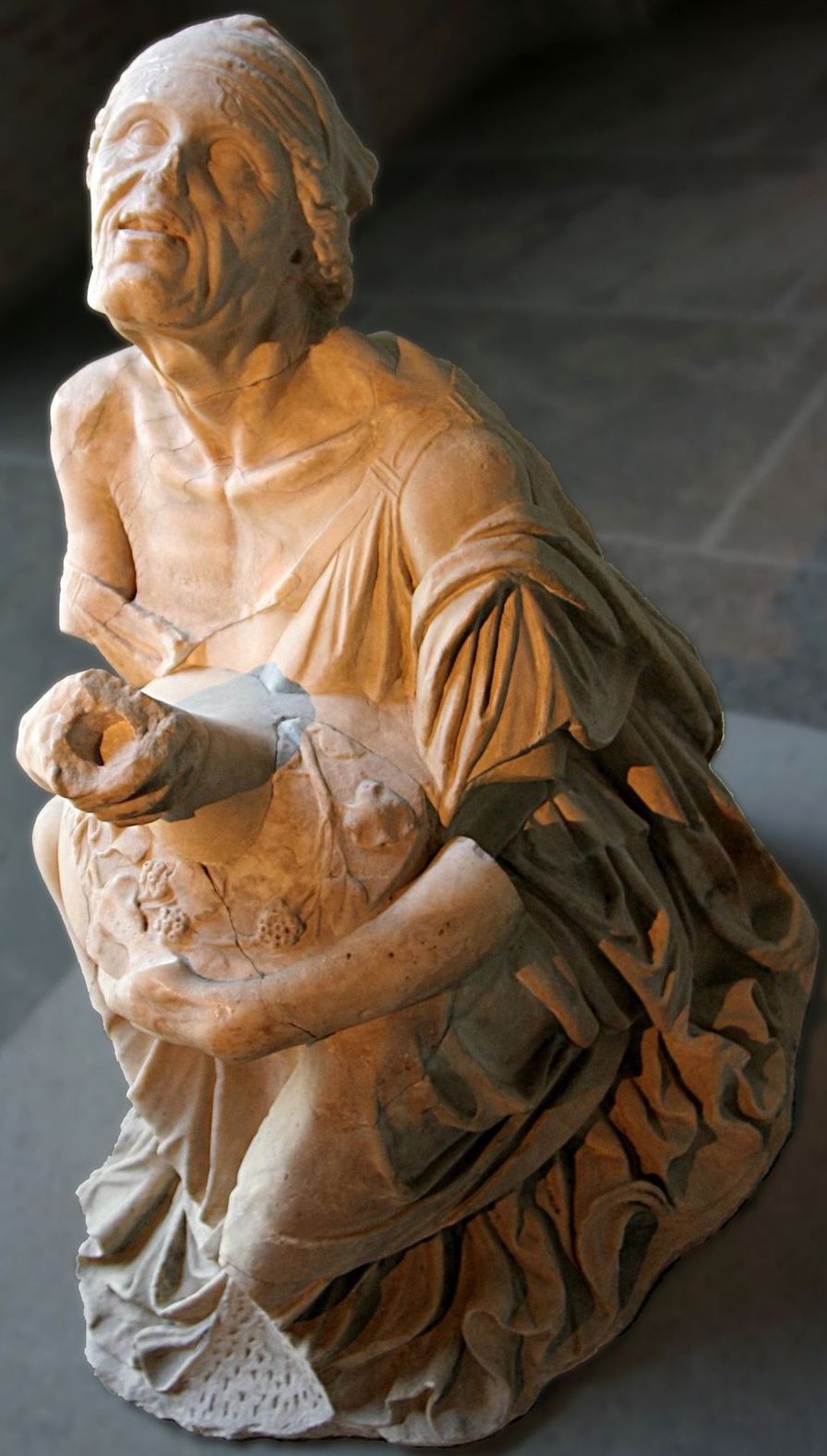
John 20:1-10 (Matins)
Acts 11:19-26,29-30
John 4:5-42
A Beginning
"Woman, believe Me. The hour is coming ...."
In the Name of the Father and of the Son and of the Holy Ghost.
Amen.
Today we have arrived to a mountain-top moment in a Gospel which
leads through
the highest summits
in human history.
But Jesus singles out this moment:
"Believe me. The hour is coming," He announces.
And
we stand back and take in what is laid before us:
In a three-year ministry whose theme is conversion of life ("Metanoeite!" He cried),
we see the first conversion of life take place right before us.
Jesus declares He has come for "the lost sheep of the House of Israel,"
and today He stands in the capital city the historical Kingdom of Israel, Shechem.
He called His Disciples announcing the restoration of the "Kingdom of Heaven" religion of the Patriarchs,
and
now He sits by a great monument of the Patriarchs, Jacob's Well.
Not far from here is the site where the Temple of Mt. Gerizim had stood
before being destroyed, only recently, by the Kingdom of Judah, to the south.
We behold the first Evangelist, a woman who will be Equal to the Apostles.
How blind we have been for so many years to single out St. Paul as the foremost example of this figure:
In him we also see a dramatic conversion of life beginning on the Damascus
Road but then throughout the Roman Empire.
Saul was a Pharisee of the House of Judah,
a Benjaminite of the Southern Kingdom.
He had rooted himself not in Shechem, but in Jerusalem
at the feet of Gamaliel.
He was devoted not to Abraham, but to Moses,
and
a practitioner of Judah-ism, a hybrid religion that
had appropriated Moses as its foremost spokesman.
He was an agent of the Mt. Zion Temple and no doubt celebrated
the destruction of the Mt. Gerizim Temple.
He also will become Equal to the Apostles.
Do we see the mirror image?
The former is
a foremost conversion story of the Northern Kingdom.
The latter,
a foremost conversion story of the Southern Kingdom.
The former is a devout daughter of Abraham;
the latter will become a devout son of the greatest Patriarch,
whom he will call "father of our faith."
Both Saul of Tarsus and the Samaritan woman
are utterly lost to God:
Saul by committing his mind to a false religion which has yielded rage
as its spiritual temperature,
the woman by committing her soul to animal sex resulting in personal disintegration.
The Lord Jesus,
Who sees the first and the last,
Who directs all holy dramas,
lays this before us
at a most holy site of the Hebrew lifeworld:
Shechem,
not far from the ruin of the ancient Temple on Mount Gerizim.

As He and His followers approach Jacob's Well,
He encounters a daughter of Abraham.
She lives in a landscape of alienation
—
her Temple razed to the ground by the Jews,
her lifeworld crumbling over the centuries.
As Jesus approaches,
the only world she knows is the path of clay.
And she knows it very well.
For sexual appetite has ruled her life.
Sexual intimacy has become her spirituality, her god.
Sexual hunger has propelled her forward every day.
And she has journeyed through many husbands in this pilgrimage towards eternal death
—
a fact that suggests her serial adultery.
Why should she have so many husbands?
Because none of them would abide a wife with a roving eye.
And this remains her story as she meets with God.
She treads the cruel path of clay,
day after day,
year after year,
back and forth,
bearing her jar
in order to serve her present sexual partner, who refuses to marry her ....
but will accept her water (so to speak).
(And should we would not see her disintegrating jar
as a symbol of the part she has offered to men as her prime asset?)
In this dead-end life,
she and the clay have become indistinguishable.
The heavy jar dominates her frame now, nearly has become part of her.
It is crazed with cracks,
and
leaks just as the
light of Heaven has been ebbing out of her life for decades.
Then,
on a day,
she encounters the One Who will free her from this deathlike trance.
And like Dismas, the crucified thief on Jesus' right hand,
she will shake off her clay.
She will permit new life to shine from her swelling heart,
and
she will own all that she has done
in order to claim
all that she might have.
She does not deny.
She does not cavil.
She does not explain
in her life confession.
But she
accepts with openness and simple assent:
|
The woman said to Him, "Sir, I perceive that You are a prophet."
|
From this moment,
owning her guilt and shame without hesistation,
she receives God's forgiveness.
Indeed,
she is transformed into an Apostle
—
the first apostle
to proclaim the light of Christ to a dark world.
She rushes into her town
and
ignites
a mass conversion of the townspeople.
Her transformation,
her complete reversal of life,
is signified by a simple,
profound act:
|
The woman then left her water jar, [and] went her way ....
(Jn 4:28)
|
She is a new woman
(St. Paul would say).
She will no longer be the nameless "woman"
lumbering toward an all-clay death.
But instead she becomes
a ever-yielding fountain
sharing with others the life-giving waters of Jesus:
|
And many of the Samaritans of that city believed in Him
because of the word of the woman who testified ....
(Jn 4:39,42)
|
She will be Photini
(after the Greek for "light," phos),
the "enlightened one,"
for she is filled with the light of Christ (Mk 4:21),
a lamp-stand shining out to the world (Mt 5:15-16):
Then they said to the woman, "Now we believe, not because of what you said,
for we ourselves have heard Him, and we know that this is indeed the Christ,
the Savior of the world."
(Jn 4:42)
|
The woman at the well is renewed in God's life-giving power.
She has imbibed the waters of Heaven's Kingdom,
and she has become one with those waters
just as she nearly had become one with disease and death,
signified by her cracked, clay burden.
She has embraced the promises of Christ.
This is all her life now:
"Whoever drinks of the water that I shall give him will never thirst.
But the water that I shall give him will become in him a fountain
of water springing up into everlasting life."
(Jn 4:14)
|
As she stands so near to the Holy One of Israel,
His radiance,
His dunámis,
flooding into her soul,
she has opened herself to it.
She has emptied herself of secrets not worth holding,
and
she has become a new creature in God's light:
Photini,
"all light,"
the first Christian evangelist,
Equal to the Apostles.
From this mountain top,
we are able to forsee the countless transformed souls that lie ahead.
A whole lifeworld has languished in darkness to the south.
The historical Kingdom of Judah has now invented a new religion,
Judah-ism,
patterning it on authentic Hebrew belief
but
introducing Mesopotamian idolatry.
This is the breaking point.
Practitioners of the new religion,
who are now called "the Jews,"
claim that Jesus' followers would take take away
their altar of blood sacrifice
and
"change the customs which Moses delivered to us" (Acts 6:14).
Had not their Master, Jesus, driven this presence out of the Temple (Mt 21:12-17)?
Did He not say that He will destroy this Temple?
Yes, a vast landscape of alienation still lay ahead.
A palpable darkness lies like a heavy weight on God's people.
The Temple would indeed be destroyed.
The custom of blood sacrifice would indeed come to an end.
And the ancient custom of following God unto deification would be restored:
living fountains of water reviving the lost sheep would ebb up from the faithful like Photini;
Divine light shining from God's sons and daughters like Photini's children.
All this still lay ahead.
But on this day,
surrounded by the lifeworld of the Patriarchs,
standing among the lost sheep of the House of Israel,
the God of Abraham and of Isaac and of Jacob makes a start.
And in these marvelous things,
experienced in the capital city of the ancient Kingdom of Israel,
the children of Abraham hear what we have come to call the "Good News":
"the Kingdom of Heaven has drawn near."
In the Name of the Father and of the Son and of the Holy Ghost.
